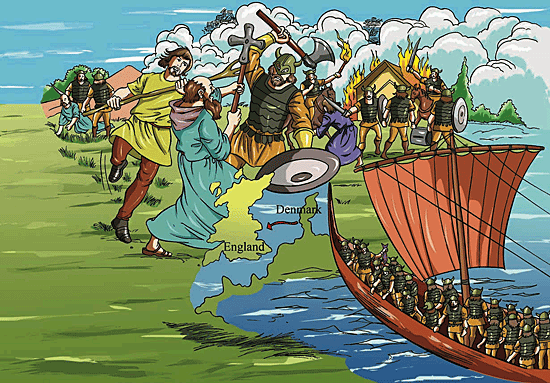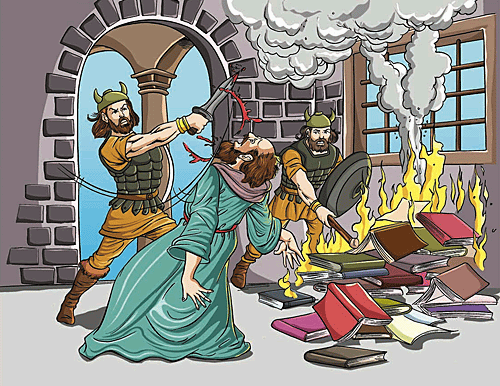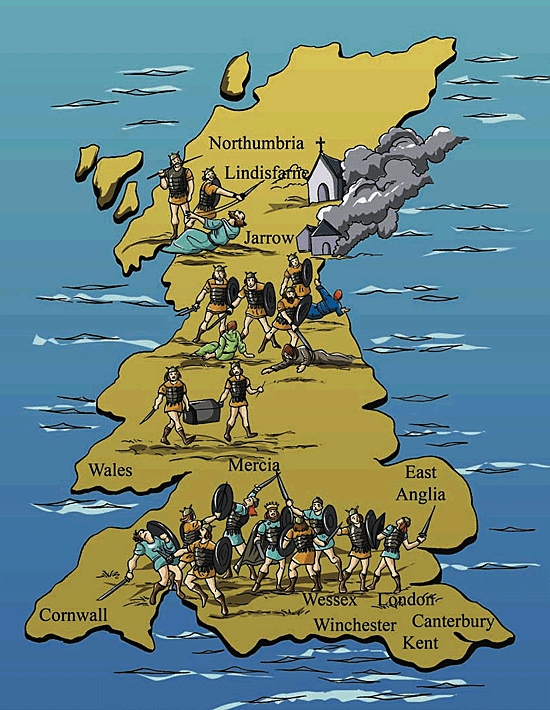English and Its Historical Development, Part 13
(Vikings destroyed and plundered much of England)
In A.D. 789, the Vikings began raiding and plundering Britain with fire and sword

Traveling from their Scandinavian homeland in long ships, the Vikings pillaged and conquered far and wide across northern Europe and the Atlantic.
They subjected the Franks and Germans to fierce harassment, established a powerful dynasty in Russia, raided Islamic Spain, settled Iceland, and even touched the coast of North America.
In about 789, Viking raiders from three ships landed at Dorchester (on the Dorset coast of Wessex), slew defenders and local officials, and looted the town.
The English were taken by surprise because their relations with their Danish and Norwegian neighbors was previously peaceful.
In fact, they regarded them as relatives, not-too-distant cousins whose language, blood, and background were similar to their own.
It wasn't long before monastic writers who either witnessed or received reports of the continuing cruel and relentless horrors of the sea rovers, started referring to them as "this furious, ferocious, ruthless, wrathful, pagan people".
In subsequent years, countless other raiders, first from Norway, then from Denmark, plundered and settled in England and the islands off its coasts.
Four years after the raid at Dorchester, in 793, a much larger and more formidable Viking fleet attacked the wealthy monastery of Lindisfarne off the Northumbrian coast, massacred many of the monks, and bore the others off into slavery along with the abbey's rich hoard of gold and silver vessels, jeweled shrines, costly robes, and sacred treasure of all kinds as well as food and wine.
The following year they returned and pillaged Bede's monastery at Jarrow (Bede had died fifty years before).
In successive springs, they returned again and again on the coasts of Ireland and Scotland; Iona was sacked three times, the monastery at Kildare was attacked fourteen times; because the Vikings learned that monasteries were swiftly resupplied after each raid by wealthy men who hoped through such generosities to win absolution for their sins and to improve the status of their entry into the next world.
It is said that "the sanctuaries of God" were desecrated, "the bodies of the saints trampled on like dung in the street".
In A.D. 865, the great Viking army invaded England with the intention of staying
In the initial chapter of the Viking saga the longboats had landed with the first good winds of spring; their crews then spent the summer in marauding, and with the coming of autumn returned to their home bases along the bleak Baltic coasts.
In the year 865, the mighty invasion forces which the Anglo-Saxon chroniclers later referred to as "The Great Army" descended on England with the intention of staying.
In A.D. 870, the Vikings destroyed the last monastic schools in Northern Britain

In 870, the Viking attack against Wessex began in earnest, and with every hope of success.
For the next decade its warriors, traveling on horseback but fighting on foot, rampaged the length and breadth of Britain.
Although the English fought bravely in many of the bloody battles, the Danes established themselves firmly in the conquered land and virtually destroyed the political organization of the island.

The kingdoms of Northumbria, Mercia, and East Anglia ceased to exist
The Kingdoms of Northumbria, Mercia, and East Anglia no longer existed. Only Wessex, under the leadership of Alfred, rallied in stubborn resistance and initiated the long, slow struggle to reconquer England for the English.
Alfred was a monarch of many talents: a warrior, and administrator, a friend of scholarship, and a singularly persuasive leader. With his reign, the history of the English monarchy truly started.
Proceed to Part 14, Alfred the Great.
INDEX or Table of Contents, English and its historical development.
References: sources of information.
